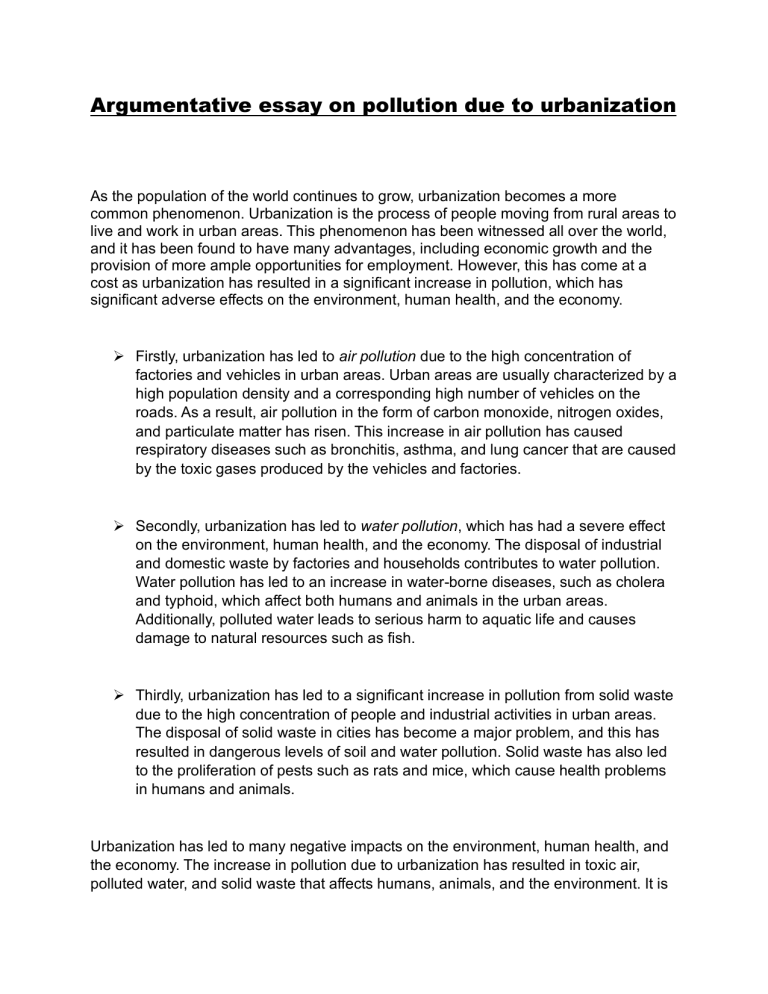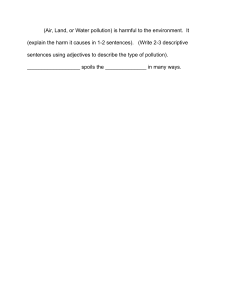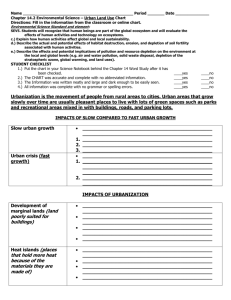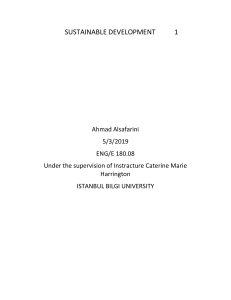
Argumentative essay on pollution due to urbanization As the population of the world continues to grow, urbanization becomes a more common phenomenon. Urbanization is the process of people moving from rural areas to live and work in urban areas. This phenomenon has been witnessed all over the world, and it has been found to have many advantages, including economic growth and the provision of more ample opportunities for employment. However, this has come at a cost as urbanization has resulted in a significant increase in pollution, which has significant adverse effects on the environment, human health, and the economy. ➢ Firstly, urbanization has led to air pollution due to the high concentration of factories and vehicles in urban areas. Urban areas are usually characterized by a high population density and a corresponding high number of vehicles on the roads. As a result, air pollution in the form of carbon monoxide, nitrogen oxides, and particulate matter has risen. This increase in air pollution has caused respiratory diseases such as bronchitis, asthma, and lung cancer that are caused by the toxic gases produced by the vehicles and factories. ➢ Secondly, urbanization has led to water pollution, which has had a severe effect on the environment, human health, and the economy. The disposal of industrial and domestic waste by factories and households contributes to water pollution. Water pollution has led to an increase in water-borne diseases, such as cholera and typhoid, which affect both humans and animals in the urban areas. Additionally, polluted water leads to serious harm to aquatic life and causes damage to natural resources such as fish. ➢ Thirdly, urbanization has led to a significant increase in pollution from solid waste due to the high concentration of people and industrial activities in urban areas. The disposal of solid waste in cities has become a major problem, and this has resulted in dangerous levels of soil and water pollution. Solid waste has also led to the proliferation of pests such as rats and mice, which cause health problems in humans and animals. Urbanization has led to many negative impacts on the environment, human health, and the economy. The increase in pollution due to urbanization has resulted in toxic air, polluted water, and solid waste that affects humans, animals, and the environment. It is therefore important to implement measures to mitigate this problem, such as enforcing the proper disposal of waste, encouraging the use of public transportation systems, and promoting the development of technologies that reduce the emission of harmful gases by factories and vehicles. Failure to address the issue of pollution due to urbanization will have long-term negative consequences on the environment and human health, and it will compromise any gains made in terms of economic growth. Pollution due to urbanization: Urbanization has resulted in significant environmental problems, including pollution. Rapid urbanization has often led to the overuse of natural resources, increased traffic, enhanced industrialization, and the creation of significant levels of waste. The primary sources of pollution due to urbanization are: 1. Air Pollution: Buildings, transportation, and industrial activities are among the leading contributors to air pollution in cities. They play a significant role in the release of harmful gases like carbon monoxide, sulfur dioxide, and nitrogen oxides, which cause health problems like respiratory issues. 2. Water Pollution: The disposal of wastewater from industries, household, and commercial activities has resulted in the contamination of water bodies in urban areas. Sewage is usually carried out to rivers or ocean causing water pollution. 3. Noise Pollution: Urbanization also leads to high levels of noise pollution due to traffic, construction, and industrial noise. Prolonged exposure to such noise levels is harmful to health. 4. Light Pollution: The excessive use of artificial lighting in urban areas has led to light pollution. This has disrupted the natural circadian rhythms of humans and animals and has a detrimental effect on the environment. 5. Soil Pollution: Construction activities, landfills, and the disposal of hazardous waste are among the main causes of soil pollution. Soil pollution can contaminate the food chain. Hence, urbanization can bring many benefits like economic growth, better quality of life, and improved social development. However, it also brings significant environmental challenges that must be tackled to ensure sustainable urban development. Causes of Urbanization: ➢ Urbanization is one of the significant causes of pollution. The growth of cities and sprawling urban areas leads to the release of harmful gases, chemicals, and waste products into the environment. As more and more people move into cities, the need for transportation, housing, and infrastructure increases, resulting in increased levels of pollution. ➢ The use of motor vehicles for transportation, factories emitting smoke and pollutants, and the generation of waste products such as plastic, contribute to air, water, and land pollution. The urban areas are more polluted due to their concentration of population and economic activities. ➢ Urbanization also leads to the destruction of natural habitats and green areas, which play a vital role in mitigating pollution. Deforestation and urban sprawl contribute to soil degradation, loss of biodiversity, and increased greenhouse gas emissions. These factors are associated with climate change and its ripple effects. Overall, Urbanization indeed contributes significantly to pollution, and taking steps to mitigate the negative effects is essential for a sustainable future.




